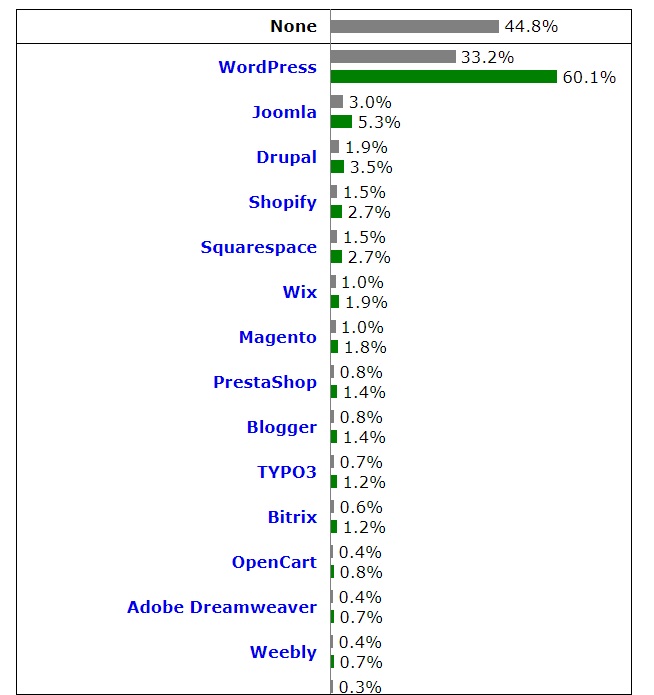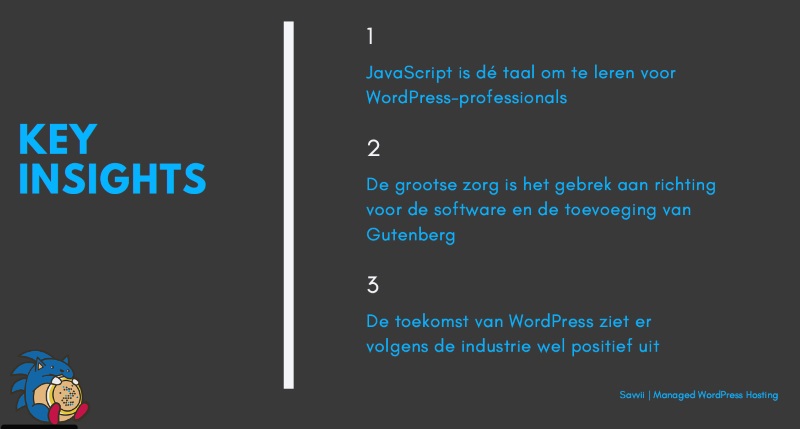What does the future of WordPress look like? That’s a question I often ask myself. Is WordPress still the best system to work with, is it still growing and what do users think about this content management system (cms)?
WordPress recently performed a major update to WordPress 5.0. The most important change is the new Gutenberg editor, the word processor that puts the content on your website. With this WordPress follows the development of other content management systems such as Wix and Squarespace, with which you can easily build your own websites.
The future of WordPress
Let’s first take a look at the popularity of WordPress. For years, usage has been increasing and continues to do so. If we look at a statistic from W3Techs, it turns out that WordPress has by far the largest market share in February 2019.

More than 33 percent of all websites in the world use WordPress. Joomla and Drupal, numbers 2 and 3 respectively, follow at a great distance.
But also the user-friendly Wix and Squarespace stand far away. But it is expected that especially these cms will grow considerably. The Wix system is also free-of-charge and very easy to use: you can build a website without technical knowledge by using blocks, which you can move back and forth.
WordPress 5.0
The fumes from WordPress 5.0 have only just disappeared, so it’s not quite clear yet how this update will be received by the users.
Some people think it’s fantastic, others prefer to stick to the old editor. Fortunately, WordPress offers the possibility to use the old editor for a few more years.
I also write this article in the new editor of WordPress, but I can imagine that people have to get used to it. The search for the functions and the interface is very different.
That the new editor is not well received by everyone, is also shown by the reviews of the Gutenberg plugin. Most reviews are negative and that is an indicator that there are still improvements to be made to the new editor.

Here you can see that the new editor gets 2 out of 5 stars. That’s not good…
When we talk about the future of WordPress, I think the new editor is a step in the right direction. You have to keep an eye on the competition, continuously innovate and make it as easy as possible for the user.
Marketing
Because WordPress is open source software (may be used and edited by anyone), there is no real owner of this cms. As a result, there has been no real focus on marketing in recent years.
That’s gonna change now. Matt Mullenweg, the founder of WordPress, has announced in his blog that he has appointed two people for marketing. One of them is Joost de Valk, a well-known person in the WordPress community who, among other things, developed the popular SEO Yoast plugin.
‘His role will be to lead the marketing team and oversee improving WordPress.org, related websites, and all its outlets‘, Matt writes.
WordPress Developers
Recently, a study was also published on what the industry itself thinks about the future of WordPress.
The industry around WordPress represents a value of 10 billion euros worldwide. In other words, all the companies and people who work with WordPress generate a turnover of 10 billion. Think of website builders, marketing agencies and hosting companies. That’s quite a lot!
The study states that 78 percent of the industry is positive about the future of WordPress. However, there are also concerns about the cms and the industry is advocating the following improvements:
- better media library;
- better Gutenberg documentation;
- better multilingual support (= better translations)

Conclusion
Nothing lasts except change, once said by the Greek philosopher Heraclitus, who lived from 540 to 480 BC.
The transition to the new editor is only an intermediate step towards the future of WordPress. Steps still need to be taken to make WordPress even better, more user-friendly and more accessible.
I wrote about the future of WordPress in 2016, and back then 25 percent of all websites were built with WordPress. So in three years, there has been an increase of 8%.
Nobody knows what the future will look like, but I expect the growth to continue. It is important that the WordPress industry continues to listen to the wishes of the user. They ultimately determine whether WordPress survives.




